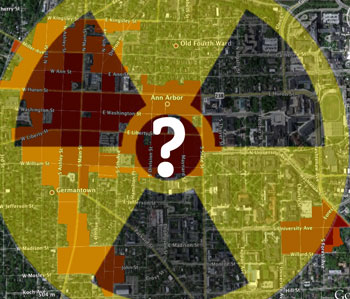No Downtown Ann Arbor Moratorium
The Ann Arbor city council has given direction to the planning commission to review downtown zoning – without imposing a moratorium on approval of site plans for downtown Ann Arbor. A moratorium had been contemplated in the council’s original resolution. The action took place at the council’s March 18, 2013 meeting.

Would a moratorium on D1 zoning site plan review be consistent with a view that Ann Arbor is “radioactive” to development? Components of this graphic include the D1 zoned areas of downtown Ann Arbor (darker red), D2 zoned areas (orange-ish), the symbol for radioactivity and a question mark. At a recent public meeting, the characterization of Ann Arbor as “radioactive” for developers was cheered by some residents who would prefer to see smaller-scale growth, if any. The city council considered but did not enact a moratorium on March 18.
The resolution gives specific direction to the planning commission to review the D1 zoning code and to make recommendations to the city council on possible revisions to the code.
In the original resolution, the planning commission was supposed to complete its work on or before June 4, 2013, and the city council was to act on the planning commission’s recommendations on or before August 19, 2013. But the specific timeline for the review was amended out of the resolution, in favor of a clause that indicates a specific timeline and scope of work will be forthcoming from the council. Also amended out of the resolution was any reference to a moratorium on site plans in areas zoned as D1.
There was some sentiment on the council for a moratorium, but possibly with the exclusion of projects already in the review process. Voting to keep some kind of moratorium as a part of the resolution were Jane Lumm (Ward 2), Chuck Warpehoski (Ward 5), Mike Anglin (Ward 5), Sumi Kailasapathy (Ward 1) and Sabra Briere (Ward 1). The vote on the final resolution, without the moratorium, was unanimous.
Not affected by the council’s resolution is 413 E. Huron, located on the northeast corner of Huron and Division streets. It’s a 14-story apartment building that would include 216 units totaling 533 bedrooms, with underground parking for 132 vehicles.
Also not affected by the council’s resolution is a proposed project at 624 Church Street – a 14-story building with 75 apartments and a total of about 175 bedrooms. The council gave the site plan for 624 Church Street unanimous approval at its March 4 meeting.
The wording of the original resolution exempted site plans that had already received the planning commission’s recommendation of approval by Feb. 19. So the 624 Church Street project would not have been encompassed by the originally proposed moratorium, because it received a recommendation of approval from the city planning commission on Jan. 15, 2013.
The moratorium was initially postponed from the council’s Feb. 19, 2013 meeting. That was the first council meeting after the 413 E. Huron project failed to achieve a recommendation of approval from the city planning commission. Under the originally proposed language of the moratorium resolution, the 413 E. Huron project would not have been allowed to move forward, because its site plan did not receive that recommendation of approval.
The outcome of the planning commission’s vote on Feb. 4, 2013 was not a recommendation for approval of 413 E. Huron, because the 5-3 tally in favor did not give the project the required six-vote majority. But even without a planning commission recommendation, a developer has the option of bringing a site plan proposal for consideration by the city council, which the 413 E. Huron developer did. The project appeared on the March 18 agenda, but had not been considered by the time this brief was filed at around midnight.
As they had at the council’s Feb. 19 and March 4 meetings, supporters and opponents of the moratorium addressed the city council during the public commentary period at the March 18 meeting. In written correspondence, legal action was intimated by some on both sides of the issue. A partial list of written correspondence included:
- A2Y Chamber opposition to moratorium
- Zaragon Place (Larry Deitch) in support of moratorium
- Norm Hyman in support of moratorium
- Norm Hyman comments in support of moratorium
- Christine Brummer in support of moratorium
- Multiple residents in support of moratorium
- historic district commission’s resolution in support of moratorium
- Susan Friedlaender (developer’s attorney) opposition to moratorium
- Pat Lennon (developer’s attorney) opposition to moratorium
This brief was filed from the city council’s chambers on the second floor of city hall, located at 301 E. Huron. A more detailed report will follow: [link]



